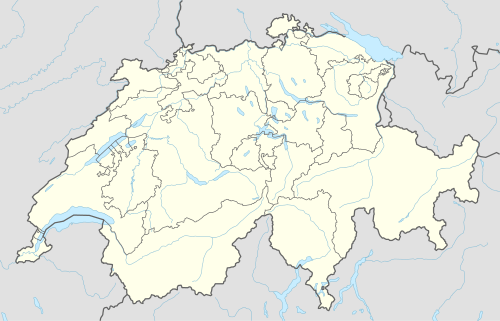Leibstadt Nuclear Power Plant
| Leibstadt Nuclear Power Plant | |
|---|---|
 The Leibstadt NPP | |
 Location of Leibstadt Nuclear Power Plant in Switzerland | |
| Country | Switzerland |
| Coordinates | 47°36′11″N 8°11′05″E / 47.60306°N 8.18472°ECoordinates: 47°36′11″N 8°11′05″E / 47.60306°N 8.18472°E |
| Construction began | 1972 |
| Commission date | May 24, 1984 |
| Operator(s) | Kernkraftwerk Leibstadt AG |
| Nuclear power station | |
| Cooling source | Rhine River |
| Cooling towers | 1 |
| Power generation | |
| Units operational | 1 × 1,220 MW |
| Average generation | 9,367 GWh |
|
Website www | |
The Leibstadt Nuclear Power Plant (German: Kernkraftwerk Leibstadt, KKL) is located near Leibstadt, canton of Aargau, Switzerland, on the Rhine River and close to the border to Germany. Commissioned in 1984, it is the country's youngest and most powerful of all five operating reactors.
A boiling water reactor built there by the company General Electric with 1,220 MW of electrical power serves the power demands of the area, the cooling is done via a cooling tower. The nuclear power station has produced approximately 8.5 TWh per year, slightly less than the power station Gösgen.
The power station is owned by Leibstadt AG (KKL), which is composed of six Swiss energy companies: the Aare Tessin AG for electricity (Atel) with 27%, the northeast power stations AG (NOK) with 23%, the central-Swiss power stations AG (CKW) with 14%, the electricity company Laufenburg AG (EGL) with 16%, the Bern power stations AG (BKW FMB energy AG) with 10% and the Aargauer of power stations AG (AEW energy AG) with 5%. The management was originally done by the EGL, but with establishment of the Axpo it was consolidated within the Axpo group, so whereby today the NOK is the manager. The plant also houses a 380 kV switchyard for Beznau.
The KKL is an old project, planning began 1964 for a 600 MW reactor with river water cooling. With the prohibition of the river water cooling by the Swiss Federal Council in 1971 a cooling tower solution was favored. In the further planning process the output was increased to 600 and then 900 MW. In 1984 the plant started after an eleven-year construction period. After the Three Mile Island accident in the year 1979 new safety regulations were implemented, and the completion was delayed several years. While the budget was originally set for 2 billion Swiss francs, and the end of construction it had amounted to over 5 billion francs.
The history of the completion of the KKL reflected increasingly critical attitudes toward Nuclear power in Switzerland during the 1970s and 1980s, which culminated in the resistance against the Kaiseraugst Nuclear Power Plant.
Nuclear events
| Year | INES level | Total | |||||||
|---|---|---|---|---|---|---|---|---|---|
| 0 | 1 | 2 | 3 | 4 | 5 | 6 | 7 | ||
| 2015 | – | – | – | – | – | – | – | – | TBA |
| 2014 | 8 | 1 | – | – | – | – | – | – | 9 |
| 2013 | 7 | – | – | – | – | – | – | – | 7 |
| Sources: 2014[1] · 2013[2] · 2012[3] | |||||||||
Gallery
 Aerial view
Aerial view


See also
References
- ↑ "2014 ENSI Oversight Report – ENSI-AN-9252". Swiss Federal Nuclear Safety Inspectorate ENSI. 24 June 2015.
- ↑ "2013 ENSI Oversight Report – ENSI-AN-8800". Swiss Federal Nuclear Safety Inspectorate ENSI. 30 June 2014.
- ↑ "Regulatory Oversight Report 2012 concerning nuclear safety in Swiss nuclear installations" (PDF). June 2013. p. 20.
ENSI rated one event as INES Level 1 — This related to an incident at Unit 2 of the Beznau nuclear power plant where a generator failed to start during a regular function test of the energy diesel generator
External links
 Media related to Leibstadt Nuclear Power Plant (category) at Wikimedia Commons
Media related to Leibstadt Nuclear Power Plant (category) at Wikimedia Commons
